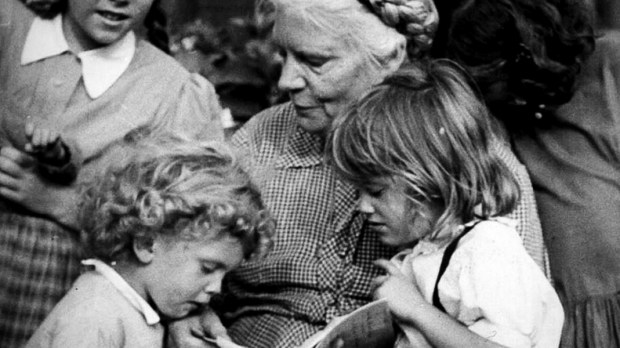That’s the question posed by City & Kingdom New York, a new network “for community, conversation, and the common good.” City & Kingdom launched this week with an event about one figure who embodies counter-cultural activism: the co-founder of the Catholic Worker Movement, Dorothy Day.
The event drew about 30 people to the warm third floor of Connolly’s, an Irish pub in midtown Manhattan. As a column of round tables running parallel to the bar piled up with hot food, cold Guinness, and free books, Susannah Black, the event organizer, took to the front of the room to talk a little bit about the origins of City & Kingdom. The idea was born out of
, a panel co-hosted by Plough Publishing House a few months earlier, where Rod Dreher and other writers discussed Dreher’s new book The Benedict Option.“It was basically a book that talked about how to create Christian community, or what was lacking in Christian discipleship, in America,” Black explained. “And there was so much enthusiasm for that, and so many people seemed to want to keep on talking about it, that we felt like this was something we wanted to do to build off that momentum and meet a need for conversations towards community.” Plough then came together with “thinkerspace” Solidarity Hall and the non-profit The Davenant Trust to co-sponsor an ongoing series of discussions.
Sam Hine of Plough then introduced their brief but powerful new collection of Dorothy Day’s reflections, The Reckless Way of Love: Notes on Following Jesus. Day was a tireless advocate for social causes – women’s suffrage, care for the poor, nonviolence – and was even arrested and imprisoned several times for civil disobedience. The Reckless Way of Love looks at the fuel for her activism: a life of Scripture, the sacraments, and prayer. “We try to shelter the homeless and give them clothes, if we have some,” Day writes in one passage, “but there is a strong faith at work; we pray. If an outsider who comes to visit doesn’t pay attention to our praying and what that means, then he’ll miss the whole point of things.”
Hine then introduced Robert Ellsberg, who was managing editor of The Catholic Worker in the late 1970s and went on to publish the diaries and letters of Dorothy Day. Ellsberg knew Day personally and offered up some interesting tidbits about her life – about her temper, her aversion to “abstract conversations,” and her hilarious reaction to the FBI’s file on her – but his reflections centered on Pope Francis’ address to a joint session of Congress in 2015.
In his address, Francis held up Dorothy Day as one of four “great Americans” (along with Abraham Lincoln, Martin Luther King Jr., and Thomas Merton), and acknowledged the spiritual source of her life’s work. “Her social activism, her passion for justice and for the cause of the oppressed, were inspired by the Gospel, her faith, and the example of the saints.” But it was a particular turn of phrase in the address that grabbed Ellsberg: that these four offered us “a way of seeing and interpreting reality.”
Day’s way of interpreting reality, Ellsberg said, meant “taking the Gospel seriously,” and encountering Christ “in the face of the other, in the face of the poor, in the face of the unwanted, the marginalized.” Sainthood is not about having a superhuman nature; it’s about ordinary people beginning to interpret reality in this new way.
The event concluded with convivial conversation among what seemed like old friends – and with both the radically “conservative” ideas of Dreher and the radically “liberal” legacy of Day in the air, you would be forgiven for wondering how everyone was getting along so well. But the mission at the heart of City & Kingdom – recovering the communal roots of Christianity in an increasingly individualistic world – is one that clearly transcends political leanings.
It also transcends religious lines. Plough is the publishing arm of the Bruderhof community, a German branch of the Anabaptist tradition whose members eschew property and salary for a shared communal life rooted in the Gospels. (The New Yorker piece on Rod Dreher closes with a conversation about the Bruderhof.) Yet, in the latest edition of Plough Quarterly, you’ll find articles on Catholics like Dorothy Day, Steven McDonald, and Martin Scorsese. The mutual respect seems to have historical roots in Germany, where a Catholic sister community of the Bruderhof called the Catholic Integrated Community flourished under the support of Pope Benedict XVI. But more than that, there seems to be a shared conviction that the themes of Catholic social teaching need to be at the heart of this recovery of Christian community.
That doesn’t mean there weren’t some big questions in the room about what the future holds. There were – not only for City & Kingdom, but for Christians in general – and on the face of it, the top floor of a pub hardly seemed like the place to get them answered. But for these everyday people looking to Dorothy Day, who gathered in hospitality houses looking to the disciples, who gathered in the upper room looking to the Lord … ordinary communities like this one tend to bear extraordinary fruit.
[Interested in City & Kingdom? Sign up to learn more or to join the network at: cityandkingdom@gmail.com.]

